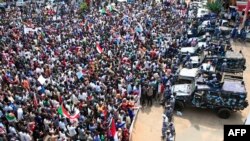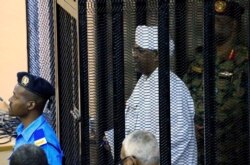Months of peaceful protests helped force Sudan's autocratic President Omar al-Bashir out of office in April after 30 years.
The Sudanese Professionals Association (SPA), a coalition of labor unions, led the way in organizing the protests. Now, the group and other opposition organizations are working with the military to create a new democratic government.
It is slow work, says Mohammed Nagi al-Assam, the SPA spokesperson who has been at the forefront of the protest movement.
The country has a new Cabinet and six civilians sit with five military officers on the Sovereign Council, the country's new executive body. There is a commitment to hold elections and have a fully civilian government in three years.
"And things are going on slowly but they are going in the right direction to achieve all the demands and goals of the project of change in Sudan," the 28-year-old al-Assam said in an interview at VOA headquarters this week.
He pointed out one sign of progress: the United Nations Office of the High Commissioner for Human Rights plans to open an office in Sudan.
"We want to ensure that every Sudanese citizen, especially in the conflict areas, are enjoying their freedoms and enjoying their rights," he said. "And the Office of Human Rights would help a lot in ensuring that, in watching the situation of human rights in Sudan and any reporting as well any sort of human rights violation that could happen throughout the transitional period and beyond."
So far, most of the change in government has been in the capital, with state governors who worked under Bashir remaining in place. Part of the problem, he said, is that the Sudan Revolutionary Front, or SRF, an armed rebel group that has battled the government for years, has not yet signed a peace deal.
Reaching peace deal
The SRF has been involved in drafting the new constitution, he said, and it will be part of the government once it signs a peace deal.
"We are working with them very (hard) to ensure that we can reach that peace swiftly and very fast to ensure the participation of every Sudanese citizen in the upcoming days and the transitional period itself and in the democracy to come after three years," al-Assam said.
The pillars of the revolution are freedom, peace and justice, al-Assam said, and that includes accountability for former President Bashir and those who aided him.
Bashir is wanted by the International Criminal Court on charges of genocide and war crimes, especially for near-daily aerial bombardments on Sudanese civilians in the Darfur region. The charges date back to 2005.
Bashir is in custody in Khartoum, but al-Assam says government leaders are still discussing his fate. Some people, he says, think the ICC will be too, in his words, "nice" to Bashir, and he should be tried in Sudan.
Others, however, want to show a commitment to international law and hand him over to the ICC in The Hague.
One point of contention, he says, is that the ICC only wants to try Bashir against the Darfur genocide.
"He has other issues that he has committed in the eastern part of Sudan, in Blue Nile, in Nuba Mountains, in the northern part of Sudan," al-Assam said. Every Sudanese citizen, he said, suffered in some way under Bashir's 30 years in power.
Committed to justice
In one way or another, al-Assam indicated, the new government is committed to justice and reform, including for Bashir's Rapid Support Force (RSF), known for its brutality in Darfur.
"We are waiting for the formation of the Commission for Transitional Justice... that will lead the way for both accountability and the issue of social and peaceful coexistence and to deal with the reconciliation and peace issues as well as the other issues of accountability through the whole crimes that al-Bashir's regime has committed," al-Assam said.
The civilians on the sovereign council are working with military leaders to push through wide reforms for all security forces, he said, with the aim of creating a "national independent professional army that is united with no factions."
But he said, much more work needs to be done to meet that goal.
Establishing nationwide peace includes addressing the needs of millions of refugees outside the country and internally displaced persons in Sudan. Areas such as the Nuba Mountains and Darfur, where rebels have fought for years, need aid and health care, which the RSF and army under Bashir had essentially cut.
The SPA spokesman said the sovereign council is working on a peace agreement for those regions and is committed to getting them access to humanitarian aid.
Some Sudanese have expressed doubts about the future of the country and the slow pace of change. Al-Assam acknowledged those concerns and urged patience. Above all, he said, the changes need the "unity of all the Sudanese people."
Al-Assam, a medical doctor, has often been suggested as a potential candidate when the country holds a presidential election in three years. He told VOA that it is too soon to talk about that, and noted that under the constitution, he won't be old enough to run, as candidates need to be at least 40 years old.





